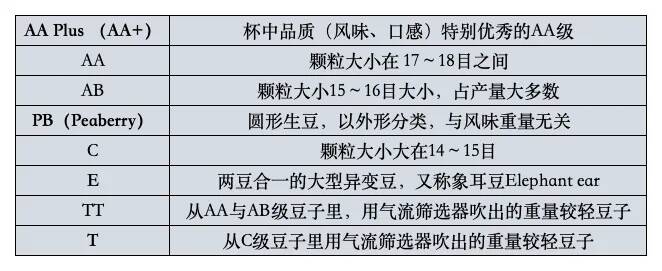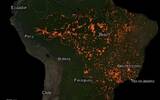What does Kenyan coffee taste like? What classification does Kenya use?
Africa has the title of "plateau continent", all because the topography of Africa is dominated by plateaus, with an average elevation of 750 meters above sea level. The whole of Africa can be divided into North Africa, Central Africa, South Africa and West Africa, and coffee is mainly grown in East Africa.

East Africa is the highest-lying region in Africa, where most of the plateaus are more than 1000 meters above sea level. East Africa is stretched north and south by the East African Rift Valley, bringing along a number of volcanoes, lava plateaus and lakes. East Africa is dominated by savanna climate, and the cool and humid climate in alpine areas, coupled with high altitude and volcanic soil, is very suitable for the cultivation of crops such as coffee, so there are many well-known coffee producing countries in East Africa. such as Ethiopia, Kenya, Tanzania and so on. Kenyan coffee is famous for its multi-level taste and juice-like acidity.
Kenya is rich in natural resources. most of the country is a plateau with an average of 1500 meters, and it is cut north and south by the eastern branch of the East African Rift Valley, dividing the highlands into eastern and western parts, and there are many volcanoes along the line. one of the most famous is the extinct volcano Mount Kenya, the second highest peak in Africa.
In addition, Kenya straddles the equator and is located in the tropical monsoon region, with most of the savanna climate, while the coastal areas are humid and hot, while the plateau climate is relatively mild, mainly in drought and rain seasons, with rainfall decreasing from 1500 mm to 200mm from southwest to northeast, with annual temperatures between 12 and 24 ℃. High-altitude mountains, volcanic soil, plenty of sunshine and appropriate rainfall provide ideal conditions for coffee growth.
Coffee cultivation in Kenya is mainly divided into three major regions, the central region of Kenya, the Great Rift Valley region of East Africa and the western region. In the western region, there are three major producing areas: Elgon Mt.Elgon, Transit-Enzoya Trans-Nzoia and Bangma Bungoma, which are mainly concentrated at the eastern foot of Elgon volcano, while the East African Rift Valley is mainly Nakuru Nakuru and Kisi Kisi, located in the central and western part of the country. The main coffee producing area is the central region, which produces 60% of the country's coffee, mainly Neri Nyeri, Kiambu Kiambu, Kirin Yajia Kirinyaga, Mulanga Murang'an and Sika Thika, which are basically around the Kenyan volcano.
Sika Thika is a small town near Nairobi, the capital of Kenya, which is mainly responsible for agricultural processing and other industries in the nearby area. The area is close to the Aberdare of the Aberdeen Mountains, has dense forests, farmland and rivers near the town, and coffee is grown between 1520 and 2200 meters above sea level. There are many well-known coffee processing plants in this area, such as the Kenyan coffee beans of Qianjie Coffee, which comes from the Asalia Asali processing plant here.
Kenya uses the same grading system for both self-sale and takeout. Grading is based on the size and quality of coffee beans as indicators, there are clear provisions, divided into AA+, AA, AB, PB, C, E, TT, T, strict classification can ensure the quality of coffee beans. In addition, the Kenyan Export and Raw Bean Association adds the grading of cup test results (unofficial) to the two grades of coffee raw beans, AA and AB, in the following order: TOP, PLUS (+) and FAQ. They rated coffee beans on a scale of 1-3 each based on acidity, alcohol thickness and flavor, based on raw and cooked bean cups. For example, a score of 1-1-1 is TOP.

Asalia coffee beans from Sika, Kenya, selected from Qianjie Coffee are common Kenyan coffee varieties SL28 and SL34. With K72 washing treatment, ripe tomatoes and flowers can be smelled. The entrance will have virgin fruit and black plum flavor, bright acidity, outstanding sweetness, juicy taste and clean taste. Qianjie Coffee believes that Kenyan coffee has an important position in the global coffee market because of its multi-level taste and juice-like acidity.
For more information about coffee producing areas, please scan the code directly and follow: coffee comments.
Long press the QR code to follow:
Important Notice :
前街咖啡 FrontStreet Coffee has moved to new addredd:
FrontStreet Coffee Address: 315,Donghua East Road,GuangZhou
Tel:020 38364473
- Prev

Coffee bean prices are high! Nearly 60% of Brazil's land is affected by drought and fires!
According to Brazilian media reports, Brazilian Natural Disaster Monitoring Center Cemaden recently released data showing that Brazil is facing the most severe drought since records began in 1950. Nearly 60% of the country's land area is affected by the drought, and it may not be until mid-September at the earliest. Effective rainfall may occur. Allegedly, Cem
- Next

Lucky installed a tea drinking machine?! Employee: Happy and sad!
▲ Click to pay attention| Daily Boutique Coffee Culture Magazine Coffee Workshop Recently, Lucky has launched new products such as Light Milk Tea and Ice Shake Series, which greatly satisfies consumers who are pursuing freshness. But for Lucky employees, more and more new products mean more syrup, thick milk, juice and other materials. They sit at the bar every day
Related
- What grade does Jamaica Blue Mountain No. 1 coffee belong to and how to drink it better? What is the highest grade of Blue Mountain coffee for coffee aristocrats?
- What are the flavor characteristics of the world-famous coffee Blue Mountain No. 1 Golden Mantelin? What are the characteristics of deep-roasted bitter coffee?
- Can I make coffee a second time in an Italian hand-brewed mocha pot? Why can't coffee be brewed several times like tea leaves?
- Hand-brewed coffee flows with a knife and a tornado. How to brew it? What is the proportion of grinding water and water temperature divided into?
- What is the difference between Indonesian Sumatra Mantinin coffee and gold Mantinin? How to distinguish between real and fake golden Mantelin coffee?
- What does bypass mean in coffee? Why can hand-brewed coffee and water make it better?
- Unexpected! Ruixing Telunsu lattes use a smoothie machine to foam milk?!
- % Arabia's first store in Henan opens into the village?! Netizen: Thought it was P's
- Does an authentic standard mocha coffee recipe use chocolate sauce or powder? Mocha Latte/Dirty Coffee/Salty Mocha Coffee Recipe Share!
- What is the difference between Vietnam egg coffee and Norway egg coffee? Hand-brewed single product coffee filter paper filter cloth filter flat solution!

